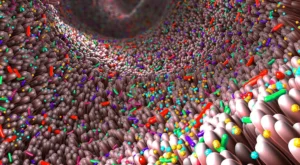
Why is gut health important? These eight gut health facts show the connection your gut has with the rest of your body’s well-being.
Fact 1. You Have Trillions of Bacteria in Your Gut
There are trillions of bacteria in your body (about 38 trillion, to be precise), the vast majority of which are found in the gut. There are enough that they actually have measurable weight—current estimates place them around 0.2 kg or 0.44 pounds. That number may fluctuate day to day, of course, but it still stands that your bodyweight is partially comprised of bacteria.
Most of these bacteria are beneficial since they break down food into important nutrients that your body needs. They don’t typically overflow your system, though, since they won’t grow beyond the amount that you feed them.
Fact 2. Probiotic Bacteria Keep Harmful Bacteria in Check
Beneficial gut bacteria are referred to as probiotics, and their purpose is to regulate your gut’s health. They do this in part by keeping harmful bacteria in check. The more helpful bacteria there are in your gut’s microbiome, the less space harmful species have to grow, which can have beneficial results for your overall wellbeing.
For instance, probiotics have been shown to help your body manage inflammation responses by keeping certain harmful strains in check. This can make probiotics a way to “reset” your gut if you have an imbalance in your microbiome.
Fact 3. Probiotics May Support Immune Function
The impact that your gut health has on the rest of your body can be significant—so much so that more research is being done to explore the impact probiotics can have on various conditions. For instance, immune function has been shown to be positively impacted when probiotics are introduced into the system. Research indicates that probiotics can have beneficial effects on various health concerns by supporting an individual’s immune response, which shows some promise when it comes to possibilities for building better overall health.
Fact 4. Gut Bacteria May Affect Cholesterol Buildup and Kidney Disease
Another way probiotics may help the body is by regulating chemicals that lead to cholesterol buildup and kidney disease. The mechanism here is a substance called trimethylamine N-oxide, or TMAO for short. TMAO is a substance produced by gut bacteria, and it has been shown to contribute to both impaired kidney function and cholesterol buildup in blood vessels.
Certain probiotic strains have been shown to reduce the production of TMAO in the gut. This means probiotics could help support cardiovascular and kidney health.
Fact 5. The Gut and Brain Are Connected
Gut health goes beyond heart and immune system health, however. There is a strong neural connection between the brain and the gut, which has been termed the gut-brain axis by researchers. The brain sends signals to the gut, and the gut sends signals back.
These signals have been shown to have an impact on certain mood and neurological concerns, including anxiety and depression. They may also help balance appetite through the pituitary gland, which controls hormones that tell your brain whether you’re full or hungry. This means your gut health may be closely tied to your mental health and your ability to manage your diet.
Fact 6. Prebiotics Help Make Probiotics More Effective
Like all microorganisms, probiotics need to be fed. Their food comes from fruits, vegetables, and whole wheat products and are called prebiotics. Prebiotic substances can help the probiotic bacteria in your gut flourish, which can ultimately result in a healthier gut.
Often, prebiotics are included in probiotic supplements, creating what is called a synbiotic. Using the two together has been shown to increase the viability of probiotics, meaning the best probiotic supplements will usually have some prebiotics in the mix. Dr. Ohhira’s formula has Prebiotics, Probiotics, and Postbiotics! This is our key difference from other probiotics!
Fact 7. Some Probiotics Are Found in Foods
Probiotics are often found in food items. Yogurt is a common example, as is sauerkraut. Aged cheese, kimchi, and pickled foods such as gherkins can also supply certain probiotic strains. However, these may be less effective than probiotic supplements since the bacteria are less likely to survive the digestive juices in your stomach and small intestine. As such, they may not reach your colon.
Fact 8. Not All Probiotic Supplements Are the Same
Finally, not all probiotic supplements are the same. As stated above, probiotics need to be able to survive your digestive system long enough to reach your colon, and not all supplements are engineered to be able to do that. In addition, they need to include a good mix of species that can help resupply your gut’s microbiome.
A probiotic supplement with prebiotics is more likely to be beneficial since prebiotics are more likely to get to your colon. In addition, the inclusion of postbiotics—substances produced by probiotics—can further support gut health. Not all supplements have these, so you’ll want to choose one that offers all three.
Learn More About Gut Health
The only 3-year fermented supplement with prebiotics, probiotics, and postbiotics is Dr. Ohhira’s probiotic supplement. To learn more about ways to your gut health, contact Essential Formulas today.
Sources Used
- NIH: Revised Estimates for the Number of Human and Bacteria Cells in the Body
- NIH: Effects of probiotics on gut microbiota: mechanisms of intestinal immunomodulation and neuromodulation
- NIH: Probiotics and immune health
- NIH: Trimethylamine N-Oxide Generated by the Gut Microbiota Is Associated with Vascular Inflammation: New Insights into Atherosclerosis
- NIH: The Gut-Brain Axis: Influence of Microbiota on Mood and Mental Health
- NIH: Probiotics, prebiotics and synbiotics- a review




